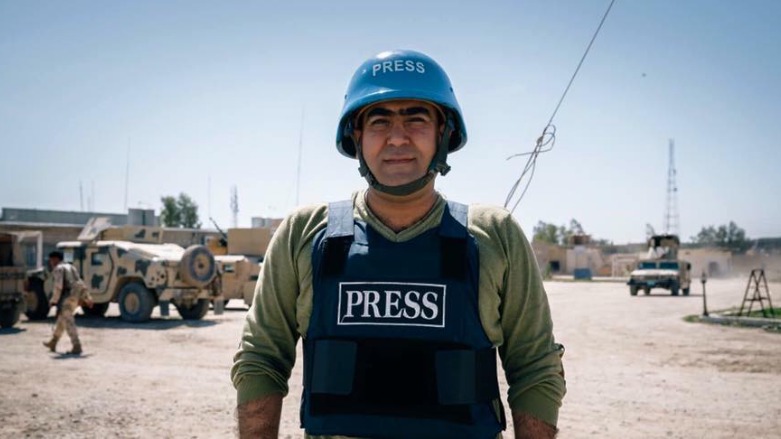Syrian Kurdish fixer wins international journalism award
Syrian Kurdish fixer wins international journalism award

ERBIL (Kurdistan 24) - Kamiran Sadoun, a media worker from Syrian Kurdistan (Rojava) has won this year’s Kurt Schork Award in International Journalism in the fixer category, the third time a Kurd has been honored in this way.
Sadoun, born in 1980 in the northeastern Syrian town of Derik, is a graduate of the English Language department at Damascus University and has lived for years in Erbil, the capital of the Kurdistan Region.
The Thomson Reuters Foundation, which awards the prize, said in a statement that Sadoun “has worked with journalists from major news outlets reporting on conflict in north-eastern Syria and the enduring suffering following the collapse of the Islamic State – including Yazidi mothers forced to choose between their children born to IS fighters or acceptance back into their communities in Iraq.”
“The judges applauded the calibre of the articles written by the reporters with whom Sadoun worked,” which the statement said were “a testament to his exceptional ability as a fixer.”
Sadoun will receive a cash prize of $5000, but due to the COVID-19 pandemic, not in person. In lieu of a physical award ceremony in the United Kingdom, as is normally the case, Thomson Reuters will be announcing the winners on its Twitter and Facebook social media channels.
“After working all these years (since 2014) with the famous journalists and agencies and covering both Iraq and Syria, winning a prize like this one is something fair,” Sadoun told Kurdistan 24.
Now in its 19th year, the Kurt Schork Awards in International Journalism are named in honor of an American freelance journalist who was killed in Sierra Leone while on assignment for Reuters in 2000.
The News Fixer Award aims to recognize fixers, individuals who typically act as the correspondent’s eyes and ears on the ground and often do much of the real journalism work for which foreign reporters receive credit.
According to the Kurt Schork Memorial Fund, it is the fixers’ local knowledge, as well as their network of official – and unofficial – contacts that help journalists secure critical interviews and access important areas for the out-of-town correspondents.
This is the third time in a row that a Kurd wins the prize.
Sangar Khaleel, a Kurd from Mosul, won the prize last year for working with journalists from major news outlets covering the rise and fall of the so-called Islamic State in Iraq. The judges for the prize applauded Khaleel’s courage and dedication in the field.
Read More: Kurdish fixer wins Kurt Schork Memorial Award in journalism
In 2018, the Syrian Kurdish fixer Wael Resol was nominated three times by international journalists who hired him in Iraq, Wael was commended for his “courage, dedication and flexibility, three of the most important qualities that a fixer must possess…he is a credit to the profession and a huge boon to any journalist working with him.”
“I’m not the first as a Kurd and a Rojava fixer, but the first one who wins this prize for stories from Rojava. Sangar and Wael won this prize for working on stories about Mosul,” Sadoun told Kurdistan 24.
After the Islamic State overran Mosul in June 2014 and tried to advance toward the Kurdistan Region in August 2014, there was a lack of fixers and translators for foreign journalists that traveled from all over the world to Erbil to cover the war against the terror group.
As a result, many English-speaking Kurdish college graduates and students started to find work as fixers to help the foreign journalists. Especially during the major operation to take back Mosul, many journalists were working from Erbil.
Also in northeastern Syria, many Syrian Kurds started to work as fixers during the fight against the Islamic State by the Kurdish-led Syrian Democratic Forces (SDF). Some of them also worked in Iraqi Kurdistan and Iraq during the battle against the Islamic State fought by Iraqi and Kurdish Peshmerga forces.
“As you know most of News Fixers don’t get credit from stories they worked on, especially for TV and Radio stations,” Sadoun told Kurdistan 24. “So this News Fixer Award guarantees recognition for my work.”
Editing by John J. Catherine